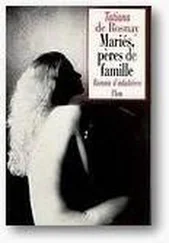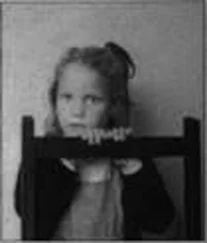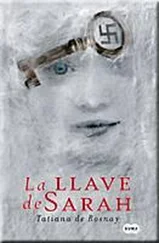I looked back toward the village, the sinister dark spire of the church on my left.
Sarah Starzynski had toiled up that very road. She had walked past where I was standing now, and she had turned left, into the camp. Several days later, her parents had come out again, to be taken to the station, on to their deaths. The children had been left alone for weeks, then sent to Drancy. And then to their solitary deaths, after the long trip to Poland.
What had happened to Sarah? Had she died here? There had been no sign of her name in the graveyard, on the memorial. Had she escaped? I looked beyond the water tower, standing at the edge of the village, heading north. Was she still alive?
My cell phone rang, making us both jump. It was my sister, Charla.
“Are you OK?” she asked, her voice surprisingly clear. It sounded like she was standing right next to me, and not thousands of miles away across the Atlantic. “I had a feeling I should call you.”
My thoughts dragged away from Sarah Starzynski to the baby I was carrying. To what Bertrand had said last night: “The end of us.”
Once again, I felt the sheer heaviness of the world around me.

THE TRAIN STATION AT Orléans was a busy, noisy place, an anthill swarming with gray uniforms. Sarah pressed against the old couple. She did not want to show her fear. If she had made it all the way here, that meant there was hope left for her. Hope back in Paris. She had to be brave, she had to be strong.
“If anybody asks,” whispered Jules, as they waited in the line to buy the tickets to Paris, “you are our granddaughter Stéphanie Dufaure. Your hair is shaved off because you caught lice at school.”
Geneviève straightened Sarah’s collar.
“There,” she said, smiling. “You do look nice and clean. And pretty. Just like our granddaughter!”
“Do you really have a granddaughter?” asked Sarah. “Are these her clothes?”
Geneviève laughed.
“We have nothing but turbulent grandsons, Gaspard and Nicolas. And a son, Alain. He’s in his forties. He lives in Orléans with Henriette, his wife. Those are Nicolas’s clothes, he’s a little older than you. Quite a handful, he is!”
Sarah admired the way the old couple pretended to be at ease, smiling at her, acting like this was a perfectly normal morning, a perfectly normal trip to Paris. But she noticed the quick way their eyes darted around constantly, always on the watch, always on the move. Her nervousness increased when she saw soldiers checking on all passengers boarding the trains. She craned her neck to observe them. German? No, French. French soldiers. She had no identification on her. Nothing. Nothing except the key and the money. Silently, discreetly, she handed the thick wad of bills to Jules. He looked down at her, surprised. She pointed with her chin toward the soldiers barring the access to the trains.
“What do you want me to do with this, Sarah?” he whispered, puzzled.
“They are going to ask you for my identity card. I don’t have one. This might help.”
Jules observed the line of men standing in front of the train. He grew flustered. Geneviève gave him a dig with her elbow.
“Jules!” she hissed. “It could work. We must try. We don’t have any other choice.”
The old man drew himself up. He nodded to his wife. He seemed to have regained his composure. The tickets were bought, then they headed toward the train.
The platform was packed. Passengers pressed against them from all sides, women with squealing babies, stern-faced old men, impatient businessmen wearing suits. Sarah knew what she had to do. She remembered the boy who got away at the indoor stadium, the one who had slipped through the confusion. That was what she had to do now. Make the most of the pushing and squabbling, of the soldiers shouting orders, of the bustling crowd.
She let go of Jules’s hand and ducked. It was like going under water, she thought. A tight, compact mass of skirts and trousers, shoes and ankles. She clambered past, pushing herself on with her fists, and then the train appeared, right in front of her.
As she climbed on, a hand grabbed her by the shoulder. She composed her face instantly, molding her mouth into an easy smile. The smile of a normal little girl. A normal little girl taking the train to Paris. A normal little girl like the one in the lilac dress, the one she had seen on the platform, when they had been taken to the camp, on that day that seemed so long ago.
“I’m with my granny,” she said, flashing the innocent smile, pointing to the inside of the carriage. With a nod, the soldier let her go. Breathless, she squirmed her way onto the train, peering out of the window. Her heart was pounding. There were Jules and Geneviève emerging from the throng, looking up at her with amazement. She waved at them triumphantly. She felt proud of herself. She had gotten on the train all by herself, and the soldiers hadn’t even stopped her.
Her smile vanished when she saw the number of German officers boarding the train. Their voices were loud and brutal as they made their way through the crowded corridor. People averted their faces, looked down, made themselves as small as possible.
Sarah stood in a corner of the carriage, half hidden by Jules and Geneviève. The only part that was visible was her face, peeping out between the old couple’s shoulders. She watched the Germans draw nearer, gazed at them, fascinated. She couldn’t keep her eyes off them. Jules whispered at her to look away. But she couldn’t.
There was one man in particular that repelled her, tall, thin, his face white and angular. His eyes were such a pale shade of blue they seemed transparent under thick pink lids. As the group of officers passed them by, the tall thin man reached out with an endless, gray-swathed arm, and tweaked Sarah’s ear. She shivered with shock.
“Well, boy,” chuckled the officer, “no need to be afraid of me. One day, you too will be a soldier, right?”
Jules and Geneviève had painted, fixed smiles that did not waver on their faces. They held on to Sarah casually, but she could feel their hands trembling.
“Nice-looking grandson you have there.” The officer grinned, rubbing his immense palm over Sarah’s cropped head. “Blue eyes, blond hair, like the children back home, yes?”
A last appraising flicker of the pale, heavy-lidded eyes, then he turned and followed the group of men. He thought I was a boy, thought Sarah. And he didn’t think I was Jewish. Was being Jewish something that one could immediately see? She wasn’t sure. She had once asked Armelle. Armelle had said she didn’t look Jewish because of her blond hair, her blue eyes. So my hair and my eyes have saved me today, she thought.
She spent most of the trip nestling close to the old couple’s warm softness. Nobody spoke to them, nobody asked them anything. Staring out of the window, she thought of Paris edging nearer by the minute, bringing her closer to Michel. She watched the low gray clouds gather together, the first fat drops of rain splatter against the glass and trickle away, flattened by the wind.
The train stopped at the Austerlitz station. The station she had left from, with her parents, on that hot, dusty day. The girl followed the old couple out of the train, heading up the platform to the métro.
Jules’s step faltered. They looked up. Directly ahead, they saw lines of policemen in their navy uniforms, stopping passengers, demanding identity cards. Geneviève said nothing, gently pushed them on. She walked at a firm pace, her round chin held high. Jules followed in her wake, clasping Sarah’s hand.
Standing in the line, Sarah studied the policeman’s face. A man in his forties, wearing a wedding band, a thick, gold one. He looked listless. But she noticed that his eyes darted back and forth from the paper in his hand to the person standing in front of him. He was doing his job, thoroughly.
Читать дальше












